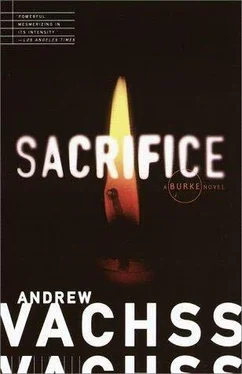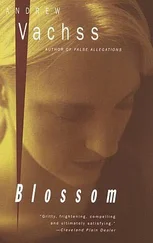My eyes caught a color photograph on the dresser, propped up in a goldtone frame. I walked over to it. The woman, standing next to a tall, sheik-handsome man with a mustache, wearing a cream-colored suit, panama hat.
I held it up. "This Emerson?"
She nodded.
I popped the picture out of the frame. "Fix it," I told Clarence. His razor sliced surgically, leaving me just the man's photo. I slipped it into my pocket.
"What gonna happen to me?" the woman asked.
"Nothing. You're okay."
"I'm pregnant, mistah," she said as we stepped out the door.
29
We exited the hotel into a blanket of misty rain. Clarence started to cross the street. I patted his arm to halt him.
"The car's over there, mahn."
"Emerson didn't have a car."
"So what we do?"
"What he did. Come on."
30
We walked down the block, heading for the lights of La Guardia Airport to the north. Pitch dark now, but the block was choked with humans. Wheeling, dealing, stealing.
"Too many eyes," I said to myself. We crossed the service road— stood on the other side. To our left, the bridge to the airport. A deep ravine underneath, cut down the middle by the Grand Central Parkway.
"Let's try down there," I told Clarence.
We stepped in carefully. The underbrush was so thick you couldn't see the ground. We worked our way downhill. I spotted a refrigerator crate lying on its side against a tree, motioned Clarence to be quiet. A man crawled out of the crate, shuffled off into the darkness. We followed a narrow dirt trail toward the highway. On both sides, humans. A whole colony of homeless, living in the jungle. I could feel the watching. No way Emerson buried a baby here without being seen.
We reached the highway, turned left, in the direction of Manhattan. Cars shot by only a couple of dozen feet away— we were invisible.
"How we gonna find anything out here, mahn?"
"Keep quiet, Clarence. Let me work."
The monster's work. Being him. He didn't have a car. He had a body. He didn't have time.
Feeling my way.
Moonlight glinted on tree branches. Taking me back to the jungle in Biafra a long time ago. This time, hunting. Then, I was the prey.
Voices. Chanting sound from above us, high on the rise. We started up the hill. I looked back at Clarence— the pistol was in his hand, face set.
We stepped into a clearing. The moonlight slanted, pulling my eyes to a gnarled tree growing on a sharp angle out of the sloping ground. Something…I looked closer. Suspended from a rope, a leather bag, maybe two feet long, banana-shaped. The seam was closed with heavy stitches, crosshatched with long pins, pearly red and white heads in an alternating pattern. The bag swung gently in the night, like a lynched man. I felt the fear imploding in my gut. My hands shook.
Clarence saw it too. "Juju," he whispered. "Very bad, mahn. This is an evil place."
We skirted the tree, climbing toward the top. The chanting came closer. Then we saw them. A phalanx of black males, standing in a wedge formation. Wearing long white shirts with little round collars, black pants. Looking out over the rise, the leather bag swinging down below them. Clarence raised the pistol, sighting in.
I whispered, "No!" Tugged at his sleeve, pointing to our right. He shuddered, his whole body shaking.
I took the lead. We worked our way about another quarter mile in the direction I'd pointed, climbed down to the highway.
"He couldn't go that way," I said, pointing back to where the chanters worshiped the leather bag. "We've got to cross the road. Ready?"
Clarence nodded. We waited for a break in traffic. Made a dash for it. Waited on the highway divider for another break, charged across to the other side.
We skirted the airport, the giant planes fog-shrouded, only their lights visible, following the chain link fence. No place to hide a body. We came to a residential block running parallel to the airport. Turned right.
"What you looking for now, mahn?"
"Water," I told him. Thinking back to prison. Watching and learning. Studying the freaks. They're always magneted to water. I remember asking the Prof about it, one cold day on the yard, trying conversation to keep warm.
"How come the skinners always work near water, Prof?"
"It's astrology, schoolboy. The stars in the sky never tell a lie— you know what they say, you can find your way.
"Astrology is bullshit."
"No, bro', here's what I know. The true clue— the real deal. Inside, a man's not blood, he's water. That's what we are, mostly water. The moon pulls the water, the tide takes the ride. Same moon pulls on us."
"So how come the freaks…?"
"The moon's for seekers, schoolboy. Some it pulls strong, some it pulls wrong.
I knew there was water out there. Rikers Island stands just to the west of the airport. Nice name for a jail. I remembered hearing the water from my cell window. Emerson must have done time, must have been there too. He'd know.
The chain link fence made a ninety degree left turn. I looked up at the street sign. Nineteenth Avenue.
Big white metal panel on the fence, red and black letters: NO TRESPASSING.
"In there," I told Clarence, pointing.
The bottom of the fence had been pulled loose. Clarence held it up like a blanket off the ground. I slid through on my belly. He lay on his back, bench-pressed the fence off his chest, used his legs to push him under.
The jungle was thick on the other side. A clear path to the water, well worn.
Dampness muffled the airport sounds. Behind us, lighted houses, parked cars. Ahead, black water. I knew its name from the maps I'd read in jail— Bowery Bay.
The path disappeared. The undergrowth was belt high, cuppy ground below pulled at my feet. We pushed our way through, reached the edge. Thick wooden posts stood upright between cracked slabs of concrete. Scuffling noises, scratchy sounds. Rats.
"I don't like it here, mahn."
The Rock was straight ahead. To our left, the Hazen Street Bridge. The one that carried busloads of humanity every Visiting Day, some hearts full of pain, some mouths full of dope, to be exchanged with that first kiss, contraband-sweet.
We walked to the edge. Looked down. I found a fist-sized stone. Tossed it in. Listened for the sound.
"Deep water." Clarence.
"Deep enough," I said, watching the softly lapping current. Remembering how cons used to study the tide tables like it was the Bible. Rikers Island wasn't Alcatraz— plenty of guys had made it outside the wire, gone into the water and lived to tell about it, usually Upstate.
"This is it," I said to Clarence. "This is where he dumped the baby's body. Derrick's in there."
Clarence looked out into the night. His young man's voice fluttered in the dark mist. "No, mahn. I don't think so. I think maybe the devil has him."
31
My Plymouth was waiting in the side yard of Jacques's joint.
"You'll tell him?" I asked Clarence.
"Don't you want…?"
"Tell Jacques, I'll be around, give him a call."
His mahogany face was set, eyes troubled.
"It's okay," I said. "All over now. We found the truth— if the baby's not in the water, he's in the ground."
"It wasn't the baby's body the old woman wanted, mahn."
"It's all that's left."
"No, my friend, there's one thing left."
"Better ask Jacques about that first."
"Do you know we love children, mahn? Our people?"
"Yes."
"My mother, she was handy with the switch, mahn. A strong woman." His pale tracker's eyes held mine. "And Mother, she had her men friends too. But never, never once, mahn, I tell you, would any of them ever raise a hand to me— it would be worth his life. I started this"— waving his hand panoramically in front of him, the hand so quick to hold an automatic or a straight razor— "for her, mahn. For the money. She is gone now. Every year, on the day of her birth, I honor her."
Читать дальше












